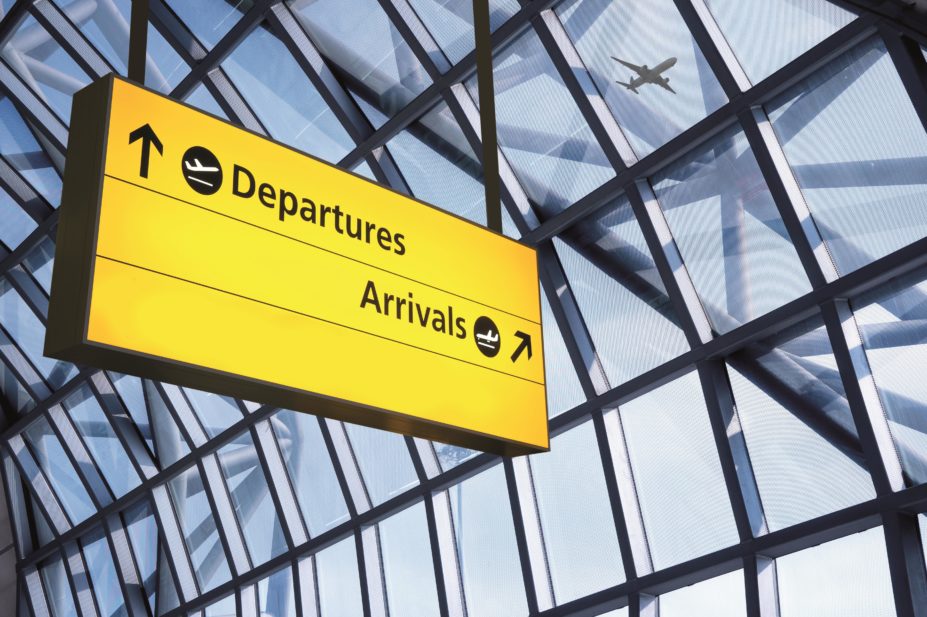
Shutterstock.com
With a degree in pharmacy, you have a skill that is sought the world over. So, if you are stuck in a rut or not ready to settle down, would like a new challenge or just fancy seeing more of the world, rest assured there are opportunities to ply your trade in some faraway land.
Here we ask five pharmacists, who have worked or are still working away from their home countries, to share their experiences and offer advice to others considering offering their services to employers outside the motherland.
Meet the travellers
Caribbean community pharmacist
In 2010, Lisa De Costa left behind her role as a relief pharmacist to work in a community pharmacy in the Turks and Caicos Islands in the Caribbean. “I needed a change from my job in the UK and wanted something more. I love to travel and wanted an opportunity to earn money while seeing more of the world,” she explains. She returned after four years to be closer to her family.
Secondment in the Channel Islands
In 2014, after four years working for Lloydspharmacy in Edinburgh, Steve O’Hara was offered a six-month secondment in a community pharmacy in Guernsey — with the option to stay or return to Scotland after six months. “I like to experience different environments and, with Guernsey having a slightly different healthcare system and with the pharmacy being attached to a surgery, I thought this would be a good opportunity to broaden my experience,” he explains. Lloydspharmacy provided rent-free accommodation for six months and organised the necessary licence for him to work.
Middle Eastern adventure
From 2001 to 2010, Rachel Ashcroft worked as a hospital pharmacist in Abu Dhabi. “I was working as a directorate pharmacist in London but wanted a change,” she explains. “I thought if I moved elsewhere in the UK I might regret it but, if I moved abroad, it would be an adventure. I saw a job advertised in Abu Dhabi and went for it.”
Volunteering in Africa
In 2011, Pam Pauling spent a year working as a pharmacist in Tanzania — courtesy of Voluntary Services Overseas (VSO). “I needed a change, I wanted to do some development work, learn a new language and experience a different culture.” The choice of Tanzania was made by VSO since she was travelling with her husband — a paediatrician also wanting to volunteer. She spent the year working as a pharmacist in a Tanzanian hospital.
Critical care in Canada
George Dunbar moved to Calgary, Canada, in December 2005. “There was no budget for me to progress in my job in Scotland and my father had always suggested Canada would be a good place to work and settle down. After doing some research, I found that Calgary Health Region were advertising for a regional critical care pharmacist.” He started the job in January 2006 once he had completed the necessary examinations to qualify as a pharmacist in Canada. He now owns a community pharmacy in Calgary.
Preparation
Pauling’s preparation for her trip to Tanzania was considerable. As well as going through the considerable VSO application process, she also:
- Rented her house;
- Applied for a career break from her NHS job;
- Learned to speak Swahili;
- Organised the appropriate vaccinations and antimalarials;
- Revised for and took an exam to register as a pharmacist in Tanzania (covering law and the clinical aspects of practice);
- Contacted her predecessor in Tanzania to get a handover and determine what issues existed, what reference books to take and any other useful information.
By contrast, Ashcroft’s preparation was relatively simple. Her employer in Abu Dhabi organised accommodation and a visa, and her UK pharmacy registration (as for most western countries) was sufficient to practise as a pharmacist in the United Arab Emirates.
After three interviews conducted over Skype, De Costa was offered a job in one of the pharmacies in the Turks and Caicos Islands. “I didn’t accept the job straight away,” she explains. “I went out to the island and spent three weeks shadowing my boss and meeting the people I would be working with. But learning about the job was only part of it. I wanted to know things like whether there was a cinema, how easy it would be to travel off the island at weekends and what the impact was of hurricane season. I wanted to know if I could live there.”
Having accepted the job, she moved out three months later and lived in one of the many condominiums vacated during the North American summer by affluent Americans and Canadians for whom the Caribbean is their ‘winter home’.
Dunbar needed to complete several exams to work as a pharmacist in Canada. These included a university degree equivalency exam (taken in London) along with two three-hour written exams and an objective structured clinical exam (taken in Vancouver) to qualify as a pharmacist. He then took a provincial juris prudence exam and a three-month internship — to enable him to practise pharmacy in the province of Alberta. The process was expensive; he says it cost around £5,000 (excluding travel costs) to take all of the exams.
Then there was the process of moving his life to another country. “Getting settled and organising bank accounts and a house purchase can be a challenge,” he warns. That said, the task was made easier by him being a long-standing customer of HSBC — which was able to transfer his bank account to one of its Canadian branches.
Differences in practice
In Turks and Caicos, state-funded healthcare is limited. Patients must pay to see a doctor and also pay for their medicines. “Because people pay, they want to know a lot more about the medicines they are prescribed,” she says. “I think this creates more opportunities to discuss medicines with patients so you are more likely to have an impact. This, in turn, generates job satisfaction.”
In Canada, the pharmacist role can differ greatly between pharmacy sectors, according to Dunbar. “The role of a community pharmacist in Alberta is quite progressive,” he says. “All pharmacists can renew a prescription [akin to writing a repeat prescription] for a medicine already prescribed by a doctor — except for medicines like benzodiazepines and narcotics. They administer vaccinations and can get paid for issuing a patient with an annual medicine care plan (see ‘Canadian annual care plans’) and conducting follow up reviews. Hospital pharmacy is less well developed because patient contact is not as extensive as in UK hospitals — with the emphasis being placed on the most “at-risk” patients in intensive care units, cardiac units and oncology suites.”
Canadian annual care plans
An annual care plan is constructed after obtaining a drug and medical history from a patient. The patient’s prescription is then analysed and any issues — potential or actual — are identified. A plan to resolve these issues is then developed in conjunction with the patient and their doctor. The aim is to improve compliance, discontinue unnecessary drugs, make necessary dose adjustments or replace some medicines with other, more appropriate, treatments. Non-pharmaceutical interventions — such as diet, exercise and other lifestyle options — are also discussed.
Once completed, a bill for conducting the review is sent to the provincial health organisation — in Calgary, this is Alberta Health and Wellness. The cost of any drugs issued on prescription are billed to the patient’s health insurance provider — usually offered as a benefit of being employed.
In United Arab Emirates, all medicines need to be imported, which can cause problems. “If you have a supply problem, it can last weeks,” Ashcroft recalls. “Also, some people were very specific about receiving a particular brand of tablet. This would rarely be accommodated in a British hospital but, over there, some generic imports simply didn’t work. You soon realise that there are differences in practice and you just have to accept them.”
Cultural shocks
Pauling says that, however prepared you are, the move is still difficult. “With patchy internet access you couldn’t rely on using online references; and gaps between national policy and local resources meant that standards varied. Along with the heat and the difficulties I had communicating in Swahili, it can make you feel isolated.”
Having to overcome a language barrier offers an opportunity for development, Ashcroft believes. “I couldn’t speak the local language and relied on an interpreter so I learnt to read people’s body language. There were also many patients who couldn’t read or write so I’d have to figure out ways to help them take their medicines. But it means there are many opportunities to make a difference.”
De Costa recalls that Turks and Caicos has a challenge with immigration and many immigrants will travel by sloop (a type of sailing boat) to the island and find refuge in the bushes. “They were too poor to pay for their medicines and would come to the pharmacy and ask for help. These were often people who had blood pressure levels and blood glucose levels that we consider to be dangerously high in the UK — and we would need to choose which one was more important to treat because they couldn’t afford to treat both.”
“I also found, from working with doctors around the world, the ‘American’ way of prescribing is often used and it is very different to the UK. For example, oxycodone would be prescribed for minor pain, such as toothache, and azithromycin for sore throats.”
From his experience in Canadian healthcare, Dunbar agrees: “Percocet, a combination product containing 325mg paracetamol and 5mg oxycodone, is the first-choice analgesic for many types of pain.”
Additionally, De Costa learned a valuable lesson early in her stay in the Turks and Caicos Islands. “There was a Haitian lady who was unable to pay the US$4 she needed for her medicines so I paid it for her. The next day, the lady sent several of her friends and family to the pharmacy hoping I would pay for their medicines too. I soon realised that we cannot help everyone.”
In a country where resources are scarce, innovation is often needed to overcome problems that simply do not exist in the UK. In Tanzania, Pauling recalls fishing line being used for suturing, specially folded pieces of paper in place of dispensary bags and empty intravenous fluid bottles as inhaler spacer devices.
Professional support
While there can be differences in the drugs used in different countries, Dunbar does not see this as a cause for concern. “Generic drugs are the same. The brands may differ, but the differences are quite minor and don’t get in the way that much. That said, in Canada, there is a greater array of narcotics available for authorised prescribers to choose from.”
Before she was interviewed for the role, De Costa was given a list of the brands used in Turks and Caicos and the different drugs used by her employer — but that was all. “In the pharmacy, we often used reference books, such as the British National Formulary and the Lexicomp.”
In advance of moving to Guernsey, O’Hara visited the Royal Pharmaceutical Society website and found the Guernsey local practice forum (LPF). “The LPF has helped me to meet up with other pharmacists and develop a network for me to ask about how things work in Guernsey and how to solve problems. On the back of that, a group of us at the LPF are putting together an information pack for pharmacists who are new to the island on how the health system works in Guernsey and who the key contacts are.”
Advice for others
Pauling describes her year in Tanzania as “one of the hardest but most rewarding things I’ve ever done”. She is clear about what she got out of the year: “It provided me with experiences I would not have got in the UK. I spent a year immersed in another culture and overcame challenges. My role involved greater responsibilities to the one I’d held previously. Working in those conditions you become more flexible, adaptable and resourceful.”
Dunbar suggests: “If you are going to move somewhere, it’s easier to go early and, ideally, when you’re single. Moving overseas can become more tricky if you have a partner or children to consider.”
De Costa believes others should fulfil any aspirations they have: “Even if there’s just a small part of you that wants to work overseas, do it. It will allow you to see pharmacy in a different light and you will grow as a person.”
O’Hara agrees but adds: “Get as much information as you can before you move and have a back-up plan in case things don’t work out.”


